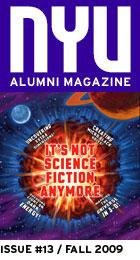theater
Laramie, Revisited
Dramatist Moisés Kaufman returns to the town that put him—and hate crimes—in the national spotlight
by Patricia Cohen
If Moisés Kaufman had to pick a single moment to mark his creative and sexual awakening, it would be his first theater class at the Tisch School of the Arts. He was 23 and had moved to the city from his home in Caracas, Venezuela, where as the son of Orthodox Jews he had attended a yeshiva. Each student had prepared a song, and a man with box-office biceps got up and sang “(You Make Me Feel Like) A Natural Woman.” “At first I thought he was being sarcastic,” Kaufman, now 45, recalls. When he realized that wasn’t the case, Kaufman expected to see smirks on the faces of his classmates. Instead they sat attentive, gently nodding in time to the music. “I didn’t know you could be an artist or you could be gay,” he explains. “Or rather, I didn’t know I could be. In that class, I saw you could do both.”Kaufman (TSOA ’89) recounts the story from behind a desk in his cluttered office on Manhattan’s Upper West Side. He adds that he did not come out to his parents until years later, noting: “It didn’t hurt that I was very successful by that point.” He yawns and then quickly apologizes. He is exhausted. As usual, Kaufman, an award-winning playwright, producer, and director has many pots simmering at the same time. He is traveling to Missouri to direct the fairy tale pastiche Into the Woods for the Kansas City Repertory Theatre, a production he hopes will end up on Broadway. At the same time, he and his company are working on an epilogue to The Laramie Project, which the Tectonic Theater Project created after Matthew Shepard, a 21-year-old gay college student, was brutally beaten and left to die on a fence in a small Wyoming town in 1998. It is scheduled to open simultaneously in 100 theaters across the country on October 12, the anniversary of Shepard’s death.
Laramie is by far the most famous creation of Tectonic, the collective Kaufman founded in 1991 with his partner Jeffrey LaHoste. (Another NYU theater class was the scene of their first meeting.) The company is devoted to pushing beyond the kind of naturalistic and realistic stage performances with which American audiences are most familiar. Consider the genesis of Laramie. After Shepard died, 10 members of the company conducted some 200 interviews with local residents, which they then spent months fashioning into a play. It has had more than 2,000 productions since its off-Broadway debut in 2000 and was later filmed for HBO.
Like Laramie, most of Kaufman’s work is based on journalistic accounts or historical records. In his view, real life is simply more fascinating than fiction—particularly those “watershed historical moments,” he says, when a culture’s inner workings and beliefs are suddenly exposed. His first play, Gross Indecency: The Three Trials of Oscar Wilde, was based on such a moment. For that, Kaufman relied on newspaper clippings, trial transcripts, and biographies to dramatically recount how Wilde was persecuted and jailed because of his relationship with a younger man, Lord Alfred Douglas.
Another Tectonic production, I Am My Own Wife, written by Doug Wright (TSOA ’87) and directed by Kaufman, won the Tony Award for Best Play and the Pulitzer Prize for Drama in 2004. In the play, which is based on the true story of Charlotte von Mahlsdorf, a German transvestite who managed to survive both the Nazis and the Communists, a single actor plays 35 characters. (Kaufman’s parents survived the Holocaust before immigrating to Latin America.)
33 Variations, which was written by Kaufman and ended its Broadway run in May, shares similar features. The drama starred Jane Fonda, who returned to the stage after a 46-year absence to play Katherine Brandt, a dying musicologist determined to solve the mystery behind one of Beethoven’s oddest compositions, the “Diabelli” Variations. Katherine travels to Bonn, Germany, to scour Beethoven’s handwritten scores, sketches, and conversation books—just as Kaufman, a classical music fan, did in real life. The show rounded up a bouquet of Tony nominations, including Best Play.
At first glance, Beethoven’s Vienna, Victorian London, and the American West may not seem to share much in common, but Kaufman insists that his work cannot be reduced to neat categories. As he has said before in interviews: “I am Venezuelan; I am Jewish; I am gay; I live in New York. I am the sum of all my cultures. I couldn’t write anything that didn’t incorporate all that I am.”
As for Laramie: 10 Years Later, Kaufman told The New York Times that he is apprehensive about returning to the town. “There had been such fervor about how Matthew Shepard’s death would make a difference,” he explains. “There are hundreds of hate crimes each year, but Matthew is the one that resonated nationally. But what if nothing has really changed?” Without undercutting his own work by revealing the answer to that question, he has noted that the log fence where Shepard was tied for 18 hours before being discovered has been removed: “There is nothing there, no marker, nothing.”







